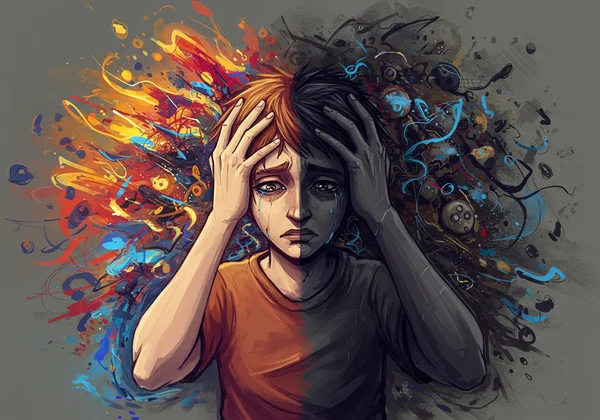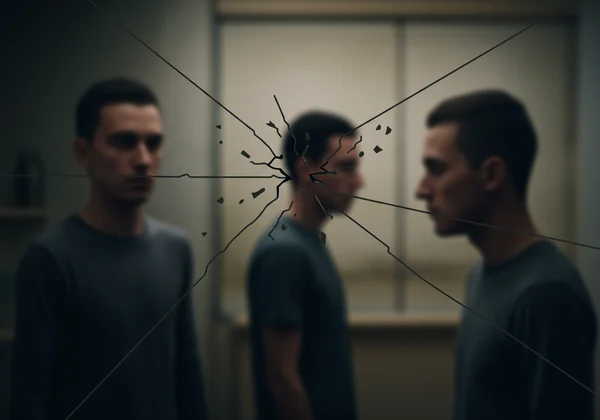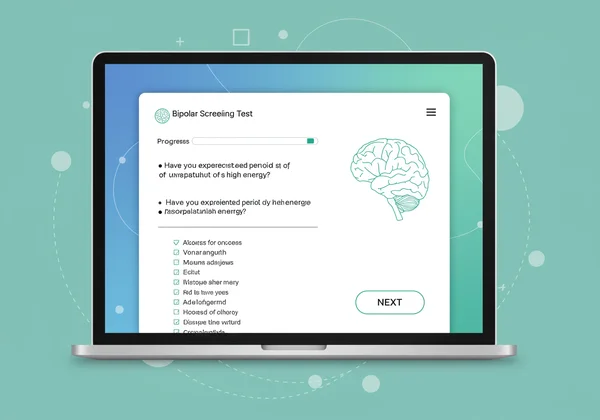Untreated Bipolar Disorder: Risks, Early Intervention, & the Role of a Bipolar Test
September 15, 2025 | By Felicity Hayes
Are you or a loved one experiencing unexplained mood shifts? The thought of a bipolar disorder diagnosis can be daunting, leading many to hesitate. But what are the real consequences of letting these symptoms go unaddressed? This guide explores the significant risks of untreated bipolar disorder and highlights why early intervention is not just important, but transformative. Understanding your experiences is the first step, and a bipolar disorder test can be a powerful tool on that journey. What happens if bipolar is left untreated? Let’s explore why taking action is crucial for long-term well-being.
Living with intense emotional highs and lows can feel isolating, but you are not alone. Many people navigate these challenges, and the key to a healthier future lies in understanding and management. Ignoring the signs can allow the condition to take a firmer hold, impacting every aspect of life. This article will shed light on those risks and, more importantly, illuminate the hopeful path that early intervention provides. If you're questioning your symptoms, consider taking a free, confidential bipolar test to gain initial clarity.

The Grave Risks of Untreated Bipolar Disorder
Allowing bipolar disorder to go unmanaged is not a passive choice; it can have compounding negative effects over time. The condition rarely improves on its own and often worsens, leading to more severe and frequent episodes. Recognizing these potential consequences underscores the urgency of seeking help and starting a path toward stability.
Escalating Mood Episodes & Symptom Severity
Without intervention, the natural course of bipolar disorder often involves a worsening of symptoms. The periods of depression may become deeper and last longer, while manic or hypomanic episodes can grow in intensity and frequency. This escalation can make daily life unpredictable and chaotic, as the swings between extreme energy and profound lethargy become more pronounced. This pattern, sometimes referred to as "kindling," suggests that each mood episode can make the brain more susceptible to future ones, creating a difficult cycle to break without professional support.
Impact on Mental & Physical Health
Untreated bipolar disorder rarely exists in a vacuum. It significantly increases the risk of developing co-occurring conditions that complicate recovery. Anxiety disorders, substance use disorders, and eating disorders are commonly seen alongside bipolar disorder, often as attempts to cope with the distressing mood swings. According to the National Institute of Mental Health (NIMH), there is also a strong link between bipolar disorder and physical health problems, including cardiovascular disease, thyroid issues, and metabolic syndrome. The chronic stress of unmanaged mood episodes takes a toll on the entire body.
Strain on Relationships & Daily Functioning
The volatility of untreated bipolar disorder can place immense strain on personal and professional relationships. The impulsivity of mania can lead to financial distress or reckless behavior, while the withdrawal of depression can create distance from loved ones. These behaviors are symptoms of the illness, not character flaws, but they can damage trust and create conflict. Work performance often suffers, leading to job instability. The fundamental aspects of a stable life—career, finances, and close bonds—are all threatened when the condition is not addressed, which is why an initial online bipolar screening test can be a vital first step.

Why Early Intervention & Diagnosis are Crucial
While the risks are serious, the outlook with early and consistent treatment is overwhelmingly positive. Acknowledging the need for help is an act of strength that opens the door to a more stable and fulfilling life. Intervention is not just about managing a crisis; it's about building a foundation for long-term wellness and reclaiming control over your life.
Stabilizing Moods and Reducing Episode Frequency
The primary goal of treatment is to achieve mood stabilization. Through a combination of medication, psychotherapy (like Cognitive Behavioral Therapy), and lifestyle adjustments, it is possible to significantly reduce the frequency and severity of mood episodes. A proper diagnosis allows healthcare professionals to create a tailored treatment plan that addresses your specific symptoms and needs. This proactive approach helps you develop coping skills and recognize early warning signs of an impending episode, empowering you to manage your health effectively.
Improving Long-Term Prognosis & Quality of Life
People with bipolar disorder who receive timely treatment can lead full, productive, and meaningful lives. Early intervention helps prevent the long-term damage that the condition can inflict on one's health, relationships, and career. By learning to manage the illness, individuals can pursue their goals, maintain healthy relationships, and find joy and purpose. Treatment is not about erasing a part of who you are; it's about giving you the tools to thrive and ensuring that bipolar disorder does not define your future. Taking action is the most powerful step toward a better quality of life.

Taking the First Step Towards Understanding and Support
The journey to wellness begins with a single step: seeking understanding. For many, this starts with acknowledging their concerns and looking for a safe, accessible way to explore them. The path from worry to clarity is paved with information and self-assessment, leading toward professional support.
When to Consider an Online Bipolar Screening Test
If you recognize yourself or a loved one in the descriptions of extreme mood swings, an online screening is a logical and low-pressure starting point. It's a confidential way to check if your symptoms align with the patterns of bipolar disorder. Our bipolar screening test is based on the scientifically validated Mood Disorder Questionnaire (MDQ) and aligned with DSM-5 criteria, offering a reliable preliminary insight. It is not a diagnosis, but it provides valuable information to help you decide on the next steps and can make the prospect of seeking help feel less intimidating.

Preparing for a Professional Consultation
After taking a screening test, the next objective is to speak with a qualified healthcare professional, such as a psychiatrist or psychologist. They are the only ones who can provide an accurate diagnosis. To make this meeting as productive as possible, come prepared. You can:
- Document your symptoms: Keep a simple journal of your moods, energy levels, and sleep patterns.
- Bring your screening results: Share the outcome of your online test, especially if you opted for our detailed AI-powered report, which can provide a comprehensive summary.
- List your questions: Write down any questions or concerns you have about diagnosis, treatment options, or what to expect.
This preparation helps your doctor get a clear picture of your experiences and empowers you to be an active participant in your own healthcare journey.
Your Path Forward: Taking Action for Well-being
Don't let the fear of the unknown dictate your path. Understanding the risks of untreated bipolar disorder empowers you to seek help proactively and rewrite your future. The challenges are real, but so is the hope that comes with effective management. Early intervention can lead to a more stable, fulfilling life where you are in control.
If you are concerned about your mood swings or those of someone you care about, taking our free, confidential bipolar test is a crucial first step. It’s a simple action that can provide the clarity and confidence needed to seek the professional support you deserve. Start your assessment now. Start your confidential bipolar test today.
Disclaimer: This content is for informational purposes only and does not constitute medical advice, diagnosis, or treatment. Always seek the advice of a qualified health provider with any questions you may have regarding a medical condition.
Frequently Asked Questions About Bipolar Disorder & Intervention
What happens if bipolar disorder is left untreated?
If left untreated, bipolar disorder typically worsens over time. Individuals may experience more frequent and severe manic and depressive episodes, an increased risk of co-occurring conditions like anxiety and substance use disorders, and significant damage to relationships, careers, and overall physical health.
Can bipolar disorder be cured?
Bipolar disorder is considered a lifelong condition with no known cure. However, it is highly treatable and manageable. Through a consistent treatment plan including medication, therapy, and healthy lifestyle choices, most people can manage their symptoms effectively and lead successful, stable lives.
How can I encourage a loved one to seek help for bipolar disorder?
Approach the conversation with empathy and without judgment. Express your concern based on specific behaviors you've observed, like "I've noticed you haven't been sleeping much and seem more agitated lately, and I'm worried about you." Offer to help them find resources or even accompany them to an appointment. Suggesting a confidential online screening tool can be a gentle way to encourage them to explore their symptoms.
How accurate are online bipolar screening tests?
Reputable online screening tests, like the one offered on our site, are based on clinically recognized questionnaires such as the MDQ. They are designed to be highly accurate as screening tools, meaning they can effectively identify individuals who may be at risk and should seek a professional evaluation. However, they are not a substitute for a formal diagnosis from a healthcare professional. They are best used as a first step to get instant insights and start a conversation with a doctor.